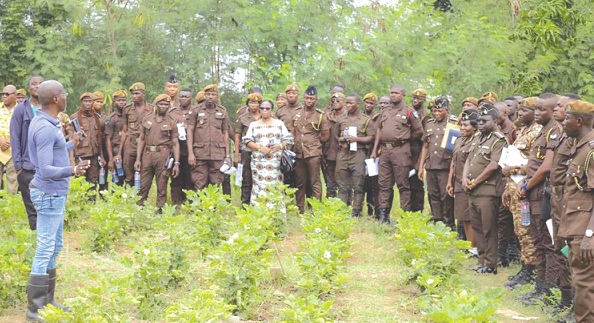
Ghana Prisons Service trains officers in agriculture
THE efforts of the Ghana Prisons Service to improve its agricultural initiatives, to contribute to the sector’s development is on course, the Rector of Prisons in charge of agriculture, Hanson Kwame Adu Awuku has announced.
Advertisement
Already, 22 of the service’s agric stations have received support from its agriculture revolving fund to engage in production of crops and trees such as maize, rice, vegetables, cowpea, soyabean, cassava, cocoa, oil palm, woodlots and livestock such as pigs, rabbits, sheep, goats, grasscutters, broilers production and aquaculture.
According to Mr Awuku, the investment was to give further credence to the fact that agriculture was the backbone of the service as products from the venture supplemented inmates ration bills.
He was addressing a training programme for some selected officers on agriculture.
The training was under the Design Thinking Approach (BRADETA) project in collaboration with the University of Ghana School of Agriculture.
It was aimed at building the capacity of nonagricultural trained officers in the service to supplement government’s inmate ration, provide skills as well as funds to carry out agric-related expansion activities.
Drawn from different stations, including Kenyase, Kpando, Amanfrom, Adwira and Jamestown, the officers would be taken through theory and physical modules to adequately boost their knowledge on agricultural studies and practices.
Farming station
Mr Awuku explained that the training programme was geared towards equipping non-agric staff in five farming stations of the service in basic agriculture.
He indicated that over the years, the service played a critical role in the internal security of the country by keeping its clients in safe custody and ensuring public safety.
However, international best practice advocates a deviation from the old warehousing of inmates to the provision of beneficial skills which, he said, was part of their mandate in the provision of reformation and rehabilitation and vision of the current administration to increase internally generated fund through agriculture.
Thus the training was an investment to build the capacity of the officers in maize, rice, cassava among other crop planting processes.
“Aside from the skills acquired by inmates in our farming stations, agriculture has been the backbone of the Ghana Prisons Service as products from the venture supplement inmates ration bills from the government”, he emphasised.
Mr Awuku revealed that efforts were being made to add value to cassava and palm fruits through processing to obtain gari and palm oil respectively.
He, therefore, entreated the course participants to take the training seriously as it was intensive.
“Though not examinable, the service demands from you a high level of professionalism and discipline during the training”, he added.
Readiness
The Dean for the School of Agriculture, University of Ghana, Professor Irene Egyir, commended the service for taking up the initiative as she stated that the service was known for its farms across all the regions where they engaged in livestock, poultry, crops, cereals, legumes among other agricultural activities.
She said the training was part of efforts to augment the number of agricultural trained officers within the service and build upon their capacity to engage in agriculture and do it in the right manner.




